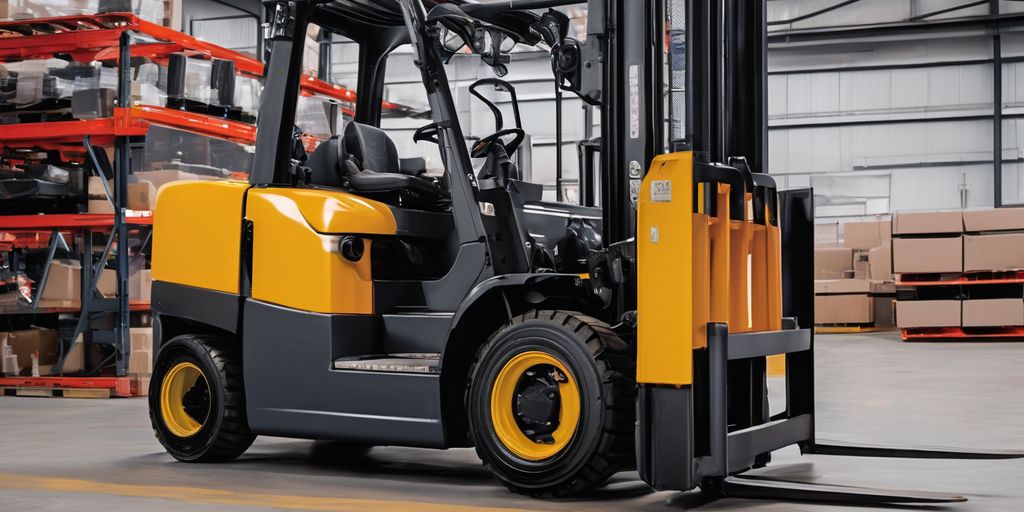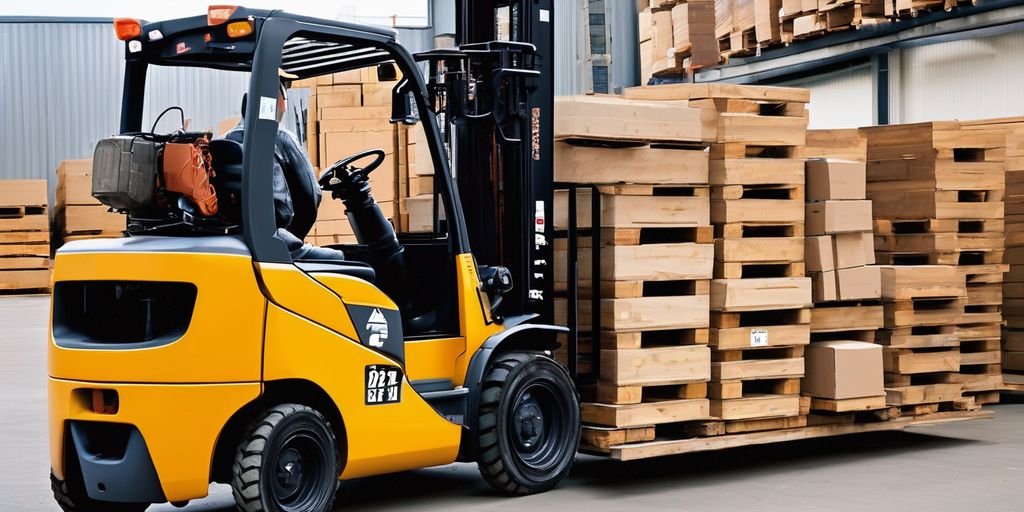Maintaining Your Forklift Battery: Tips for Longevity and Performance — overview
Taking care of your forklift battery is essential for keeping your equipment running smoothly and saving money over time. Simple daily checks and proper maintenance can extend the life of your battery, reduce downtime, and improve overall performance. Let's dive into some practical tips and best practices to help you get the most out of your forklift battery.
Key Takeaways
- Regular maintenance of your forklift battery can extend its life and save money.
- Proper charging techniques are crucial to avoid battery damage.
- Storing your battery in the right conditions prevents unnecessary wear.
- Safety measures are important to protect yourself while handling batteries.
- Knowing when to replace your battery can prevent unexpected downtime.
Daily Maintenance Tips for Forklift Batteries
Keeping up with regular forklift maintenance can ensure your facility remains productive and efficient. Regularly inspect and maintain the forklift's battery, including checking the water levels and cleaning the terminals to avoid corrosion.
Proper Charging Techniques
Avoiding Overcharging
Overcharging your forklift battery can cause serious damage. It can lead to overheating, cell imbalance, and reduced capacity. Always follow the manufacturer's instructions to avoid these issues. Using an advanced charger with multi-stage charging can help optimize the battery's longevity.
Using the Right Charger
Selecting the right charger is crucial. Ensure the charger matches the battery's type, voltage, and capacity. This prevents undercharging or overcharging, which can harm the battery. Advanced chargers are designed to optimize charging cycles and extend battery life.
Timing Your Charges
Charge your battery when it reaches 20-30% capacity. This avoids deep discharge cycles that can shorten the battery's lifespan. Also, avoid interrupting the charging cycle once it has started, as this can lead to an imbalance in the battery cells and reduce overall performance.
Proper charging techniques are essential for maintaining your forklift battery's efficiency and longevity. Following these tips can help you avoid common pitfalls and ensure your battery performs at its best.
Storage Best Practices

Ideal Storage Conditions
To keep your forklift batteries in good shape, store them in a cool, dry place. This helps prevent moisture damage and keeps the temperature from causing harm. Make sure the area is clean and free from any debris that could cause issues.
Seasonal Storage Tips
When storing batteries for a long time, charge them to about 80% capacity. This helps avoid self-discharge and keeps the battery healthy. During winter, keep the batteries away from freezing temperatures. In summer, ensure they are not exposed to extreme heat.
Preventing Battery Drain
To prevent battery drain, disconnect the battery from the forklift if it won't be used for a while. Regularly check the charge level and recharge if it drops too low. Always follow the instructions given by the battery manufacturers to ensure proper care.
Proper storage of forklift batteries can significantly extend their lifespan and maintain their performance.
Safety Measures for Battery Maintenance
Wearing Protective Gear
When working with forklift batteries, it's crucial to wear the right protective gear. This includes insulated gloves, safety goggles, and acid-resistant aprons. These items help prevent injuries from battery acid, which can be very harmful.
Handling Batteries Safely
Always handle batteries with care. Avoid creating sparks near batteries and never charge a frozen battery. Make sure to follow the charger's instructions closely to ensure safe and proper charging.
Emergency Procedures
In case of an emergency, it's important to know what to do. Have a plan in place for dealing with battery acid spills and other accidents. Keep a first aid kit nearby and make sure everyone knows how to use it.
Safety is a key part of expert forklift maintenance: essential steps for peak performance. Always prioritize safety to ensure efficiency and reduce costs.
Recognizing When to Replace Your Battery
Signs of Battery Wear
When it comes to keeping your forklift running smoothly, it's crucial to watch for signs that the battery is wearing down. Spotting these early can save you from unexpected downtime and costly replacements. One major sign is if the battery takes longer to charge or doesn't hold a charge as long as it used to. This indicates that the battery's efficiency is dropping. Another red flag is an unusually rapid drain shortly after charging.
Testing Battery Performance
Regular testing can help you understand the health of your forklift battery. Load testing, for example, assesses the battery's actual capacity versus its theoretical capacity. If the battery shows reduced runtime or capacity, it might be time for a replacement. Thermographic imaging can also uncover temperature abnormalities that signal impending cell failures.
Choosing a Replacement Battery
When it's time to replace your forklift battery, consider the type of battery that best suits your needs. Lead-acid batteries typically need replacement every 2-3 years, while lithium batteries have a longer lifespan. Make sure to choose a battery that matches your forklift's specifications and your operational requirements.
Keeping a close eye on your battery's performance and knowing when to replace it can help maintain your forklift's efficiency and avoid unexpected failures.
Professional Maintenance and Inspections
Scheduling Regular Inspections
Regular inspections are key to keeping your forklift battery in top shape. Routine checks help spot issues early, like voltage drops or capacity loss, before they become big problems. It's smart to schedule these inspections quarterly to ensure everything runs smoothly.
Benefits of Professional Services
Hiring professionals for battery maintenance has many perks. They have the tools and know-how to do thorough checks, including thermographic imaging and load testing. This can uncover hidden issues that might not be visible during a regular check.
For over 33 years, BPS has been offering world-class service, including regularly scheduled maintenance and emergency repair for forklift batteries and chargers.
Finding Certified Technicians
When looking for a technician, make sure they are certified and experienced. Certified technicians can provide expert guidance and ensure your battery is in the best condition. They can also help with emergency repairs, keeping your operations running without a hitch.
Optimizing Battery Performance
Using Battery Management Systems
Battery management systems (BMS) are essential for keeping your forklift batteries in top shape. These systems monitor and manage the battery's health, ensuring it operates efficiently. A good BMS can help you avoid common issues like overcharging and deep discharges, which can shorten the battery's lifespan.
Regular Software Updates
Keeping your BMS software up-to-date is crucial. Software updates often include improvements that can enhance battery performance and longevity. Make it a habit to check for updates regularly and install them as soon as they become available.
Avoiding Deep Discharges
Deep discharges can significantly reduce your battery's lifespan. To prevent this, try to recharge your battery before it drops below 20% capacity. This simple practice can make a big difference in how long your battery lasts and how well it performs.
Regular maintenance and smart charging habits can turn your forklift battery from a leading culprit dragging operations to a key driver of productivity.
By following these tips, you can ensure your forklift battery remains efficient and lasts longer, saving you time and money in the long run.
Conclusion
Taking care of your forklift battery is not just a good idea; it's essential for keeping your operations running smoothly and saving money over time. Simple steps like regular cleaning, proper charging, and routine inspections can make a big difference. By following these tips, you can extend the life of your battery, reduce downtime, and avoid costly replacements. Remember, a well-maintained battery means a more efficient and productive workplace. So, take the time to give your forklift battery the attention it needs, and you'll see the benefits in the long run.
Frequently Asked Questions
Why is it important to check the water levels in a forklift battery daily?
Checking the water levels daily helps keep the battery from getting too hot and ensures it works well. Low water levels can cause damage and make the battery wear out faster.
How often should I clean the battery terminals?
It's a good idea to clean the battery terminals once a month. This helps prevent corrosion, which can affect the battery's performance.
What should I do if I see damage on the battery?
If you notice any damage, such as cracks or leaks, stop using the battery right away and contact a professional for inspection. Using a damaged battery can be dangerous.
How can I avoid overcharging my forklift battery?
To avoid overcharging, always use the right charger for your battery and follow the manufacturer's instructions. Overcharging can reduce the battery's lifespan.
What are the best conditions for storing a forklift battery?
Store the battery in a cool, dry place away from direct sunlight and extreme temperatures. Proper storage helps prevent battery drain and damage.
When should I consider replacing my forklift battery?
You should consider replacing your battery if it doesn't hold a charge well, shows signs of wear, or fails performance tests. Regular checks can help you know when it's time for a new one.




Leave a comment
This site is protected by hCaptcha and the hCaptcha Privacy Policy and Terms of Service apply.